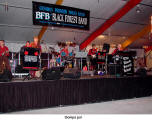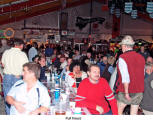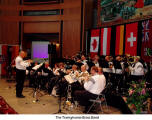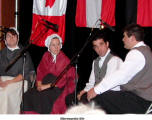
German Pioneers Day gives expression to Important Issues
Just how German are Germans in Canada? This is a very simple and valid question, but the answer is not quite as simple.
People of Germanic descent are regular chameleons when it comes to appreciation of culture. Sure, they love all things real German, but they also take to Canadian/North-American culture with the same abandon. I am no exception. This was evident on the Tuesday after Thanksgiving, when we went to Kitchener to participate in the annual German Pioneers Day.
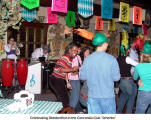 The
Concordia Club was just the right venue to let loose after the more formal
ceremony in the Rotunda at City Hall. I am not exactly the biggest
Oktoberfest fan since I hail from the northern parts of Ge
The
Concordia Club was just the right venue to let loose after the more formal
ceremony in the Rotunda at City Hall. I am not exactly the biggest
Oktoberfest fan since I hail from the northern parts of Ge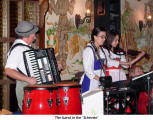 rmany,
where all things Bavarian are not necessarily as well loved. Each region has
its own heritage and prefers to emphasize that in celebrations, just like
provinces have their specialty festivities here.
rmany,
where all things Bavarian are not necessarily as well loved. Each region has
its own heritage and prefers to emphasize that in celebrations, just like
provinces have their specialty festivities here.
But that night after the City Hall festivities we found ourselves first at the "Stammtisch" in the Schenke of the Concordia Club with President Schlueter, his wife, Wayne Wettlaufer and his wife and other friends for a hearty meal from a special Oktoberfest menu.
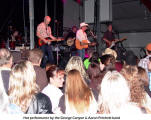 Afterwards
we were invited into the big tent, and I mean BIG! A huge dance floor was
packed with ecstatic fans to celebrate with Country Music. Already last year
George Canyon was a big hit with the visitors. He was rebooked for this year
right away, luckily one might say,
Afterwards
we were invited into the big tent, and I mean BIG! A huge dance floor was
packed with ecstatic fans to celebrate with Country Music. Already last year
George Canyon was a big hit with the visitors. He was rebooked for this year
right away, luckily one might say,
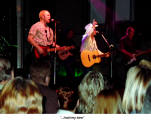 because
shortly after the booking the engaging musician won all sorts of awards in
Nashville and made big waves in the music scene, so that the price went up
so much, that it might have been doubtful if the Oktoberfest organizers
could have afforded him.
because
shortly after the booking the engaging musician won all sorts of awards in
Nashville and made big waves in the music scene, so that the price went up
so much, that it might have been doubtful if the Oktoberfest organizers
could have afforded him.
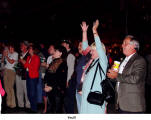 How
popular he was you can see for yourselves in the pictures. Even I was
jumping! So we know that German-Canadians like country and country rock as
much as the rest of the population.
How
popular he was you can see for yourselves in the pictures. Even I was
jumping! So we know that German-Canadians like country and country rock as
much as the rest of the population.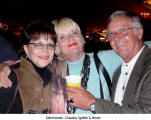
This year the Oktoberfest was again a great success and we congratulate all the participants, especially the unpaid volunteers who devote themselves to serve their community at this occasion and many others.
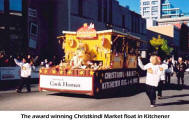 The
kick off parade showed us some fine examples of German traditions, including
the multi award winning Kitchener Christkindl Market (www.christkindlcanada.com),
with a charming float.
The
kick off parade showed us some fine examples of German traditions, including
the multi award winning Kitchener Christkindl Market (www.christkindlcanada.com),
with a charming float.
Messages of appreciation at
German Pioneers Day celebration
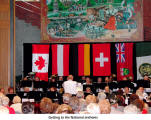 With each year that the community has been able to celebrate
the over 300 years of German presence in North America the support from
"outside" has been growing. This year even the Prime Minister of Canada
delivered a message if
With each year that the community has been able to celebrate
the over 300 years of German presence in North America the support from
"outside" has been growing. This year even the Prime Minister of Canada
delivered a message if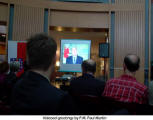 not in person, then per video. Kitchener was
unfortunately on his traveling agenda the following day, when the German
Canadian Congress caught up with him and delivered some ideas as to the
revamping of the immigration bill, which he in essence supports, or so he
said. In the video his message was clear and simple: he was delighted to
convey his best wishes to this wonderful event. Perhaps we can make this day
special in all of Canada, not just in Ontario!?…
not in person, then per video. Kitchener was
unfortunately on his traveling agenda the following day, when the German
Canadian Congress caught up with him and delivered some ideas as to the
revamping of the immigration bill, which he in essence supports, or so he
said. In the video his message was clear and simple: he was delighted to
convey his best wishes to this wonderful event. Perhaps we can make this day
special in all of Canada, not just in Ontario!?…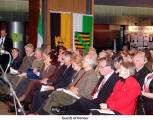 Together with the Premier of
Ontario and various other governing bodies many politicians actually turned
up in person or had greetings conveyed, such as Dalton McGuinty. All are
happily acknowledging the contributions of German Pioneers.
Together with the Premier of
Ontario and various other governing bodies many politicians actually turned
up in person or had greetings conveyed, such as Dalton McGuinty. All are
happily acknowledging the contributions of German Pioneers.
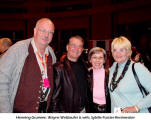 The list of well wishers in acknowledgment of German
Pioneers Day has steadily found more acceptance since Wayne Wettlaufer
managed to bring this commemorative day in as a private members bill in
1999. He did have a lot of help in lobbying from German Cana
The list of well wishers in acknowledgment of German
Pioneers Day has steadily found more acceptance since Wayne Wettlaufer
managed to bring this commemorative day in as a private members bill in
1999. He did have a lot of help in lobbying from German Cana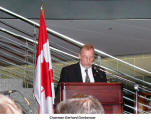 dian
organisations in Kitchener-Waterloo, especially the German Canadian
Congress. As a community we have been celebrating this fact with him ever
since, as the Committee Chairman, Gerhard Griebenau reminded us when he
introduced all the special and honoured guest.
dian
organisations in Kitchener-Waterloo, especially the German Canadian
Congress. As a community we have been celebrating this fact with him ever
since, as the Committee Chairman, Gerhard Griebenau reminded us when he
introduced all the special and honoured guest.
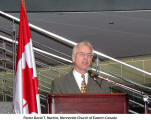 Speeches were held to a minimum but sentiments were
expressed in abundance to honour this years decedents of the early Pioneers
in Canada: The Mennonites that settled the land, and the Six Nations who
made this possible through a land purchase, referred to as the Beasely
Contract, which deeded 60 thousand acres to the Mennonite community 200
years ago.
Speeches were held to a minimum but sentiments were
expressed in abundance to honour this years decedents of the early Pioneers
in Canada: The Mennonites that settled the land, and the Six Nations who
made this possible through a land purchase, referred to as the Beasely
Contract, which deeded 60 thousand acres to the Mennonite community 200
years ago.
The Honourable Andrew Telegdi, P.C. M.P. reminded us that Germans still make up the largest ethnic community in Canada as the third largest language group. This is easily forgotten when one lives in a Metropolis as Toronto, where the ratio of ethnicity has shifted to other cultures.
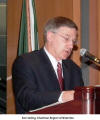 Ken Seiling, Office of the Regional Chair, tried his German
on the audience, something that is always warmly received and also reminded
us that the Germans that came to Waterloo County built the foundation for a
prospering community.
Ken Seiling, Office of the Regional Chair, tried his German
on the audience, something that is always warmly received and also reminded
us that the Germans that came to Waterloo County built the foundation for a
prospering community.
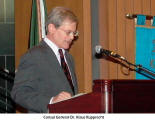 We heard from the German Consul General Dr. Klaus Rupprecht
and several other dignitaries, all of them expressing their profound
pleasure in the festivities.
We heard from the German Consul General Dr. Klaus Rupprecht
and several other dignitaries, all of them expressing their profound
pleasure in the festivities.
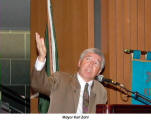 Especially Kitchener’s Mayor Karl Zehr was
happy to welcome everyone to their "Rathaus". He admitted that he
Especially Kitchener’s Mayor Karl Zehr was
happy to welcome everyone to their "Rathaus". He admitted that he
 values his
German Canadian roots, as did others.
values his
German Canadian roots, as did others.
Most interesting of course were the historical accounts of those times when Mennonites and Natives came together in harmony and friendship, helping each other establish vibrant communities.
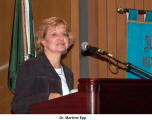 Dr. Marlene Epp delivered as a Mennonite historian a most
interesting account of the current and past statistics and stories, as did
Gerhard Griebenau, Committee Chair, and Sam Steiner, President of the
Mennonite Historical Society of Ontario, as he introduced a short drama,
well, it came across more as a comedy, about the multi-relations of 2 of the
Mennonite families in early days, giving us an idea of who was who, what was
important and what not to the Mennonites.
Dr. Marlene Epp delivered as a Mennonite historian a most
interesting account of the current and past statistics and stories, as did
Gerhard Griebenau, Committee Chair, and Sam Steiner, President of the
Mennonite Historical Society of Ontario, as he introduced a short drama,
well, it came across more as a comedy, about the multi-relations of 2 of the
Mennonite families in early days, giving us an idea of who was who, what was
important and what not to the Mennonites.
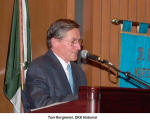 But before that could happen we were to see a descendent of
the Brubacher and Erb families being honoured and remembered for the
families’ many contributions in building that region of Ontario. Vernon
Brubacher,
But before that could happen we were to see a descendent of
the Brubacher and Erb families being honoured and remembered for the
families’ many contributions in building that region of Ontario. Vernon
Brubacher,
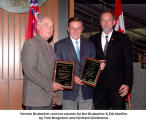 descendent of both families, was introduced by Toni Bergmeier,
National President of the German Canadian Congress (GCC).
descendent of both families, was introduced by Toni Bergmeier,
National President of the German Canadian Congress (GCC).
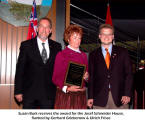 Dr. Ulrich Frisse, President of the GCC Ontario, introduced
Susan Burk, the curator of the Joseph Schneider House as the next recipient.
Dr. Ulrich Frisse, President of the GCC Ontario, introduced
Susan Burk, the curator of the Joseph Schneider House as the next recipient.
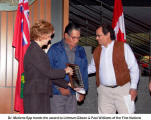 And finally, after all had been said about the Mennonites honourable
intentions, their sense of compassion and ideas about help and harmony, we
were introduced to 2 representatives of the Six Nations, Lehman Gibson and
Paul Williams.
And finally, after all had been said about the Mennonites honourable
intentions, their sense of compassion and ideas about help and harmony, we
were introduced to 2 representatives of the Six Nations, Lehman Gibson and
Paul Williams.
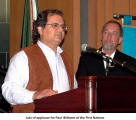 The latter responded for his people and surprised the
audience with an extraordinary sense of dignity, friendship and generosity
that goes beyond western understanding that always has and still does
measure everything in the context of how good an investment something was.
And that included the Mennonites. Owning houses and land and getting it at a
good price was part of their game of life.
The latter responded for his people and surprised the
audience with an extraordinary sense of dignity, friendship and generosity
that goes beyond western understanding that always has and still does
measure everything in the context of how good an investment something was.
And that included the Mennonites. Owning houses and land and getting it at a
good price was part of their game of life.
This commercial evaluation is quite un-Native, as became clear quickly when Mr. Williams pointed out that it never was about the money. In fact 200 years ago the Natives were aware that they were practically giving away the land, and they created a document pointing out that following generations should not think of this deal as an undervalued sale, but as an act of friendship and responsibility, since those upriver must share with those downriver.
I must think he put all of those discussing the commercial advantages of owning things and houses and land a bit to shame, even as the play, written by Barb Draper and performed by Rick Weber, Vicky Roeder Martin, Randy Baumann and Luanne Shantz, tried to explain the value of those things. Mr. Williams really stressed that commercial considerations did not or should not enter into this. He was honoured and grateful for the kind recognition of the Six Nations in this context of German Pioneers Day, and looking forward to a long and lasting friendship in the future.
The Mennonite Chapel Choir
Conrad Grebel and his Chapel Choir delighted the audience with a sampling of Mennonite music, including a South American, or was it African, sounding song. Why? Because there too will we find them, as everywhere else on the planet.
As the Transylvania Brass Band under Director Steve Shatz played most of the afternoon in a most professional manner, the proceedings of course had started with the National Anthems of Germany, Austria and Switzerland, all the countries represented by their consuls, the end was brought in by the Mennonite choir singing with all attending the Canadian Anthem, thus coming full circle in delivering important messages today.
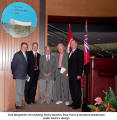 It is a fact that if we do not know and understand our past,
we will not be able to create a great future. This message came through loud
and clear in the expressions of admiration and appreciation for the founding
people of the region of Kitchener and Waterloo.
It is a fact that if we do not know and understand our past,
we will not be able to create a great future. This message came through loud
and clear in the expressions of admiration and appreciation for the founding
people of the region of Kitchener and Waterloo.
Until next time
Sybille Forster-Rentmeister
Comments to: sfr@echoworld.com


